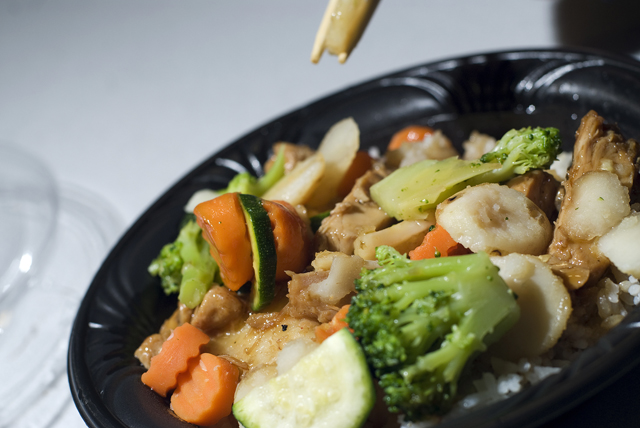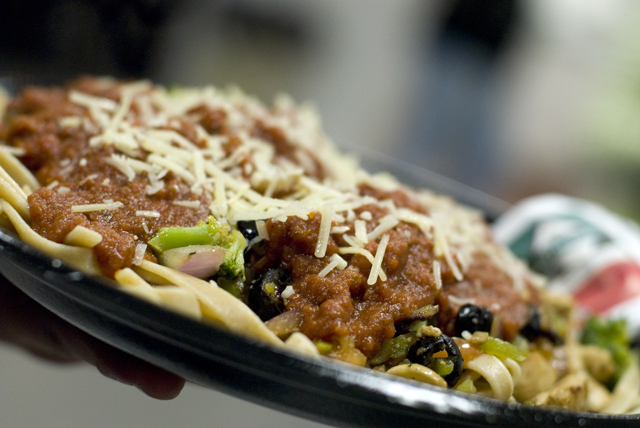Students say they prefer Be Well option
The Be Well option, which was implemented last year in hopes of combating the overwhelming amount of unhealthy foods available to students, offers tasty, healthy and, in most circumstances, cheaper meals.
A panel of USU students was established to discuss their thoughts on the Be Well program as well as the quality of food it offers. It consisted of four students, three of whom preferred eating healthy for different reasons, and another student who said healthy eating was not on the top of his priority list.
“I’m kind of a meat and potatoes kind of guy, but sometimes I get bored with hamburgers and tacos,” said junior Chris Hudson as he finished off a bowl of white rice, beef and vegetables from Teriyaki Stix. “I would go out of my way to get some of this stuff because it’s a variety for me and it’s healthy, so that’s a bonus.”
Hudson said he’d recommend a Be Well item to both heath-conscious diners as well as those who are just looking for a good meal.
Lindsay Jones, sophomore majoring in vocal performance, said she is unable to eat at most fast food places, including the Hub, because of a serious food allergy, but said she was surprised at how many options were available to her.
“I’d never been able to eat at the Hub, but they had a lot of vegan options which really surprised me. I could pick one thing from every restaurant,” she said between bites of a veggie wrap from Road Runner Wraps.
Although Jones said she did not see an adverse side to the program or the food, she said she was disappointed that there was no list of ingredients posted next to each item, something that is extremely important for people with food allergies.
Ally Bernkopf, sophomore majoring in psychology and longtime vegetarian, said she had never before heard of the Be Well option and will most likely begin to take advantage of it.
Bernkopf said she was surprised by how inexpensive Be Well items were because the majority of healthy eating establishments are pricey, which makes maintaining a healthy diet some what cumbersome.
“I think the price is well worth it. I paid $8 and some cents to get into The Marketplace the other day and I had a veggie burger and ice cream, while this Be Well veggie burger only cost me just over $3,” she said.
Fellow panel member and health conscious athlete, Ryan Avilla said he ,too, thought the program was a great idea, but may not be enough to get him to eat in the Hub on a regular basis.
“I hardly come to the Hub because it is more expensive – I usually just cook at home – but the Be Well program is fairly affordable so I might do this once a week or twice a week,” said Avilla, who paid almost $6 for pasta with meat and vegetables.
Another qualm the panel had with the Be Well menu was that, with the exception of Road Runner Wraps, there were no prices indicating how much an item was.
But everyone on the panel also agreed that their food was delicious, and when asked what they would get next time, every person pointed at the plate across from them and jabbered like excited teenagers.
Another aspect to the Be Well menu that caught the attention of all four panel members is the 10 percent off that is granted to every Be Well purchase. There is also a punch card that offers a free meal after the purchase of 10 Be Well meals.
Until this year the Be Well program was only available in the Hub, however, the program has recently expanded to include the Quad Side Café, said Caroline Shugart, employee wellness coordinator and head of the Be Well campaign.
Shugart said the program was established to offer a healthy option for those who wanted it, and at a better price. She also hopes this will be the beginning of a healthy-eating trend among students.
She also believes taking the time to purchase a Be Well meal won’t just save at the cash register, but in the long run of life.
“In the long term you won’t be put on medication and you’re saving money right at point of sale,” she said.
This program is just one of many that USU has created to help students maintain healthy living, said MarLee Harris, a registered dietitian through the Health and Wellness Center.
“The biggest thing I see is that students are super busy so they want things that are quick and cheap,” Harris said. “We want our students to feel well. We want them to be happy and healthy and in order to do that nutrition plays a big role.”
A bad diet can have adverse effects on grades, physical activity and overall attitude, Harris said. It also weakens the immune system which can make people more susceptible to illnesses, she said.
The program is also geared toward establishing healthy eating habits among college students who, by nature, do not always eat healthy, she said.
–greg.boyles@aggiemail.usu.edu

(Tyler Larson)

